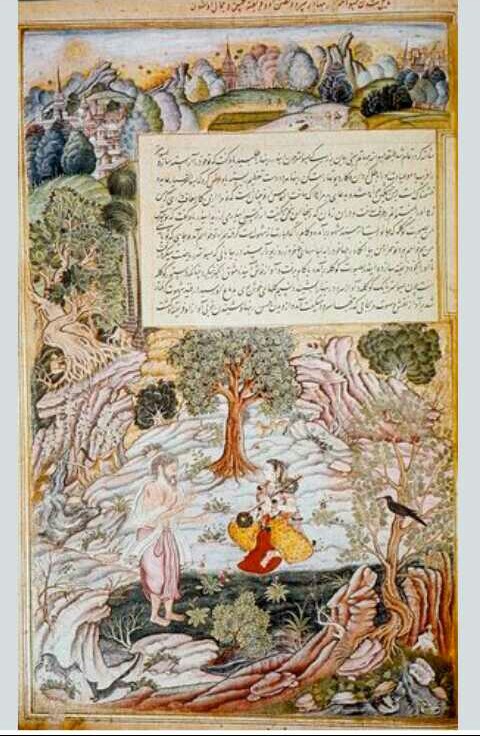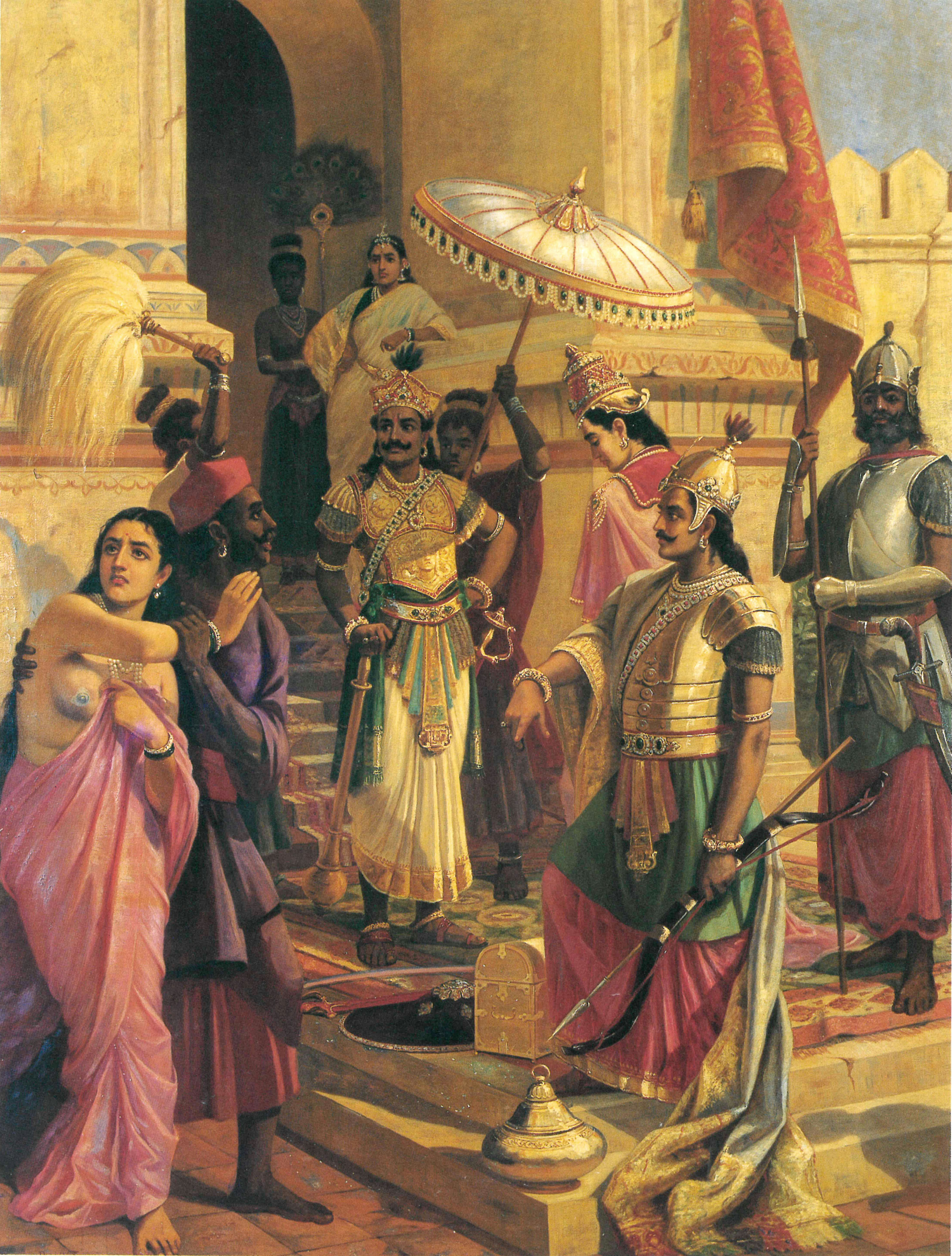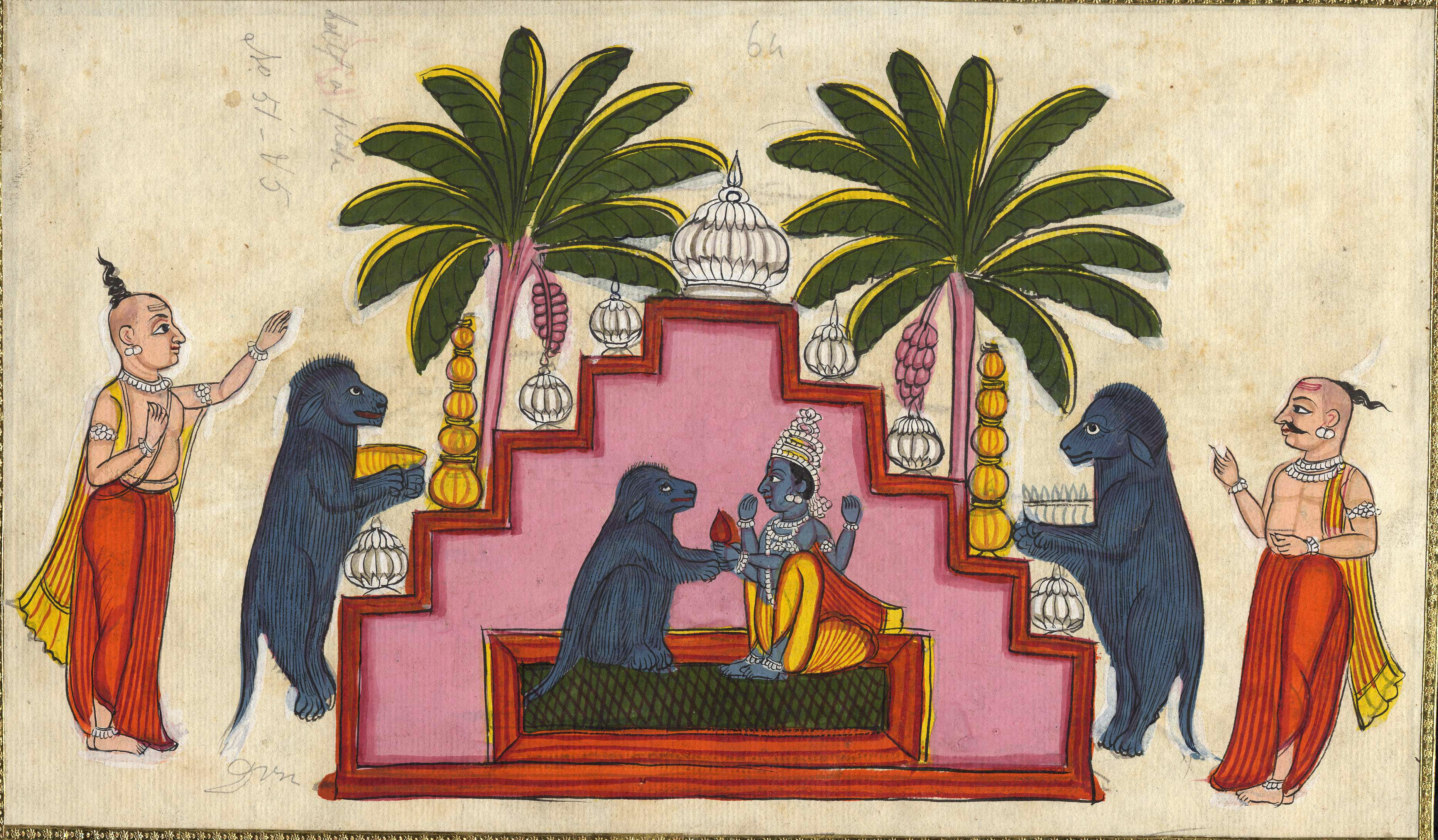|
Sri Krishna Tulabharam
''Sri Krishna Tulabharam'' () is a 1966 Indian Telugu-language Hindu mythological film, produced by D. Ramanaidu under the Suresh Productions banner and directed by Kamalakara Kameswara Rao. It stars N. T. Rama Rao, Anjali Devi and Jamuna with music composed by Pendyala Nageswara Rao. Plot The film begins with Lord Krishna & Satyabhama returning after defeating Narakasura and the entire Dwaraka gives them a warm welcome. Satyabhama is a beautiful proud, self-respected egotistical, possessive lady and she conceits herself that she is the main reason for this victory. Meanwhile, Sage Narada brings the ''Paarijata flower'' from heaven, gives it to Krishna, and asks him to present it to his best wife without any doubt he gifts it to Rukmini. Here Narada praises Rukmini and talks low about Satyabhama. Knowing this, Satyabhama becomes furious and shows her annoyance toward Krishna. Therefore, he promises Satyabhama that he has just given a flower to Rukmini but for her, he will get ... [...More Info...] [...Related Items...] OR: [Wikipedia] [Google] [Baidu] |
Samudrala Sr
Samudrala Raghavacharya (19 July 1902 – 16 March 1968), also known as Samudrala Sr., was an Indian screenwriter, lyricist, playback singer, director, and producer known for his works in Telugu cinema. Samudrala Senior made his screen debut in 1937, and known for his collaborations with Ghantasala. grand son samudrala srinivaas Personal life Samudrala Raghavacharya was born in 1902, in Pedapulivarru, Repalle Taluk, Andhra Pradesh, India. Filmography Writer # ''Kanakatara'' (1937) (debut) (dialogues and lyrics) # '' Gruhalakshmi'' (1938) # ''Vande Mataram'' (1939) (dialogue) # '' Sumangali'' (1940) (dialogue) # ''Devata'' (1941) (dialogue) # ''Bhakta Potana'' (1942) (story and dialogue) # ''Chenchu Lakshmi'' (1943) (story and dialogue) # ''Garuda Garvabhangam'' (1943) (dialogue) # ''Palnati Yudham'' (1947) (dialogue) (screen adaptation) # ''Ratnamala'' (1947) # ''Yogi Vemana'' (1947) # ''Mana Desam'' (1949) (dialogue) # ''Laila Majnu'' (1949/I) (adaptation) (dialogue) # '' Sw ... [...More Info...] [...Related Items...] OR: [Wikipedia] [Google] [Baidu] |
Padmanabham (actor)
Basavaraju Venkata Padmanabha Rao (20 August 1931 – 20 February 2010), known mononymously as Padmanabham, was an Indian actor, comedian, producer, and director who predominantly worked in Telugu cinema and Telugu theatre. He is known for his comic expressions and dialogues. In a career spanning over six decades, he acted in more than 400 films. Padmanabham made his film debut as a child actor in 1945 with ''Mayalokam''. ''Shavukaru'' (1949) was his first major hit and gave him a footing as a comedian. ''Pathala Bhairavi'' (1951) helped him find a permanent place in Telugu cinema. He acted in small roles alongside Relangi and Ramana Reddy in the golden era of Telugu cinema in the 1950s and 1960s. Later, he became a prominent comedian and remained so till the mid-1970s when Rajababu burst on the scene and replaced him. He also directed eight films including ''Kathanayika Molla (''1969), a biographical film which won him the state Nandi Award.(in Telugu) Padmanabham introduc ... [...More Info...] [...Related Items...] OR: [Wikipedia] [Google] [Baidu] |
Devaki
Devaki (Sanskrit: देवकी, IAST: ''Devakī'') is a character in Hindu literature, most noted for being the mother of the god Krishna. She is one of the seven daughters of Devapa or Devaka, a king of the Yadu dynasty, and has four brothers. She is one of the wives of Vasudeva. Her cousin is Kamsa, the king of Mathura, a cruel tyrant who had been told by Narada that he had been an asura killed by Vishnu in his previous life ( Kalanemi), exacerbating his wickedness. According to popular tradition, Devaki is considered to be an incarnation of Aditi, a mother goddess who was the daughter of Daksha and the wife of Kashyapa. Marriage During the nuptials of Vasudeva and Devaki following the former's wedding with his bride's six older sisters, Vishnu picked a lock of hair from his mount Shesha as well as his own, proclaiming that they would take be born as Devaki's seventh and eighth children, respectively. After the marriage ceremony, Kamsa volunteered to escort the newly-w ... [...More Info...] [...Related Items...] OR: [Wikipedia] [Google] [Baidu] |
Nirmalamma
Nirmalamma (18 July 1920 – 19 February 2009) was an Indian actress in the Telugu cinema. She has acted in more than 800 films. She was well known for her grandmother roles in several films.She won two Nandi Awards. Early life She was born in Machilipatnam, Madras Presidency, British India. Film career Her debut film was ''Garuda Garvabhangam'' in 1950. Nirmalamma has worked along with almost all famous artists in Telugu Cinema like NTR, ANR, Krishna, S. V. Ranga Rao, Rajendra Prasad, P. B. Srinivas, Chiranjeevi, Nandamuri Balakrishna, Venkatesh agarjuna akkineniand many more. She is one of the artists who appears in almost all of the movies of S. V. Krishna Reddy and E. V. V. Satyanarayana. In a career spanning over five decades, she worked in over 700 films and bagged Nandi award for best supporting actress for her role in ‘Mayuri’. Her roles in films like ‘Sankarabharanam’, ‘Yamagola’, ‘Padaharella Vayasu’, ‘Swathi Muthyam’, ‘Maavi Chiguru’ and ... [...More Info...] [...Related Items...] OR: [Wikipedia] [Google] [Baidu] |
Jayanthi (actress)
Kamala Kumari (6 January 1945 – 26 July 2021), known by her mononymous stage name Jayanthi, was an Indian actress known for her work in Kannada cinema and Tamil cinema. She was noted for her contributions to different genres of films from the 1960s, 1970s and early 1980s. She had appeared in over 500 films, including films in the Kannada, Telugu, Tamil, Malayalam, Hindi and Marathi languages. She had received seven Karnataka State Film Awards, four times as Best Actress and twice as Best Supporting Actress, the President's Medal for Best Actress and two Filmfare Awards for Best Actress. She has been cited as Kannada cinema's "most bold and beautiful" actress by various media outlets, a title for which she has received substantial publicity. The Kannada film industry honored her with the title "Abhinaya Sharadhe", (''Goddess Sharada in acting''). Early life Jayanthi was born in Bellary, in the erstwhile Madras Presidency of British India on 6 January 1945. Her father Balas ... [...More Info...] [...Related Items...] OR: [Wikipedia] [Google] [Baidu] |
Aditi
Aditi (Sanskrit: अदिति, lit. 'boundless' or 'limitless' or 'innocence') is an important Vedic goddess in Hinduism. She is the personification of the sprawling infinite and vast cosmos. She is the goddess of motherhood, consciousness, unconsciousness, the past, the future, and fertility. She is the mother of the celestial deities known as the adityas, and is referred to as the mother of many deities. As celestial mother of numerous beings, the synthesis of all things, she is associated with space (''akasha'') and with mystic speech (''Vāc''). She may be seen as a feminine form of Brahma, and associated with the primal substance (''mulaprakriti'') in the Vedanta. She is mentioned more than 250 times in the ''Rigveda,'' the verses replete with her praise. Family Aditi is the daughter of Daksha and Asikni (Panchajani). The ''Puranas'', such as the ''Shiva Purana'' and the ''Bhagavata Purana'', suggest that Daksha married all of his daughters off to different people ... [...More Info...] [...Related Items...] OR: [Wikipedia] [Google] [Baidu] |
Rushyendramani
Rushyendramani (1 January 1917 – 17 August 2002) was an Indian actress, singer, dancer, and playback singer from South India. She had more than 150 movies to her credit and acted in Telugu, Tamil, Kannada, Malayalam and Hindi films from the 1935 to 1986. Her notable films include '' Sri Seetarama Jananam'' (1944), '' Malliswari'' (1951), ''Vipra Narayana'' (1954), '' Chintamani'' (1956). Her last film was '' Sri Shirdi Saibaba Mahathyam'' (1986). Early life She was born in Vijayawada on 1 January 1917. A trained singer in both the Indian classical music traditions and a trained Kuchipudi and Bharatanatyam dancer, she started her career on stage at the age of seven. She donned the mantle of Krishna and Prahalada by the age of ten. Later she joined Lakshmi Vilasa Nataka Sabha of Kommuri Pattabhi Ramayya. She was trained under Kapilavai Ramanatha Sastry, Puvvula Ramatilakam and acted in the dramas ''Chintamani'' and ''Savitri''. She moved to the silver screen and acted as Satyabh ... [...More Info...] [...Related Items...] OR: [Wikipedia] [Google] [Baidu] |
Vijaya Lalitha
Vijayalalitha or Vijaya Lalitha was an Indian actress who appeared in Telugu, Tamil, Malayalam, Kannada and Hindi films in the 1960s and 1970s. She is best known for her appearances in '' Rani Mera Naam'' (1972), ''Baazigar'' (1972) and '' Saakshi'' (1967). She is also the aunt of Vijayashanti, Telugu superstar actress turned politician. Early life and background Vijayalalitha is relative to actress Vijayashanti. Vijayashanti is the daughter of Vijayalalitha's elder sister. Vijaya lalitha acted in 860 movies. Career Lalitha starred in many Telugu films in the 1960s and 1970s. She also starred in Tamil, Malayalam, Kannada and a few Hindi movies, such as ''Sadhu Aur Shaitaan'', '' Rani Mera Naam'' and '' Hathkadi''. She was well known as the "Female James Bond" in the Tamil and Telugu industries and was frequently paired with "South India James Bond" actor Jaishankar in many Tamil movies. Her dance and song sequence "Palinginal Oru Maalikai" from ''Vallavan Oruvan'' is known as an ... [...More Info...] [...Related Items...] OR: [Wikipedia] [Google] [Baidu] |
Rambha (apsara)
Rambha () is one of the prominent apsaras, the celestial nymphs of Svarga (a heaven), in Hindu mythology. She is extolled to be unrivalled in her accomplishments in the arts of dancing, music, and beauty. Legends Birth According to the '' Adi Parva'' of the epic ''Mahabharata'', Rambha and her apsaras sisters Alambusha, Mishrakeshi, Vidhyutparna, Tilottama, Aruna, Rakshita, Manorama, Subahu, Keshini, Surata and Suraja are the daughters of the sage Kashyapa and his wife Pradha. In the ''Bhagavata Purana'', the name of the mother of the Apsaras is Muni. In some ''Puranic'' scriptures, a varying account is found, according to which Rambha and other apsaras emerged from Kshira Sagara (the ocean of milk) during Samudra Manthana (the churning of the ocean). Encounter with Vishvamitra Rambha and other apsaras are frequently sent by the king of the devas, Indra, to seduce rishis (sages) and ensuring that they don't gain divine powers by self-abnegation and austerities. The '' Bal ... [...More Info...] [...Related Items...] OR: [Wikipedia] [Google] [Baidu] |
Vanisri
Vanisri (born Rathna Kumari) is an Indian actress known for her works predominantly in Telugu, Tamil, and Kannada films. In a film career spanning 40 years, she has received three Filmfare Awards South, the Nandi Awards and the Tamil Nadu State Film Award. Career Vani made her debut with the 1962 Telugu movie '' Bhishma''. She gained attention with a supporting role in a film penned by K. Balachander titled '' Sukha Dukhalu'', and '' Marapurani Katha'' (1967). Vanisri has starred in super hits such as '' Krishnaveni'', '' Prem Nagar'', '' Dussehra Bullodu'', ''Aradhana'', '' Jeevitha Chakram'', '' Rangula Ratnam'', ''Sri Krishna Tulabharam'', '' Bhakta Kannappa'', and '' Bobbili Raja''. She played dual roles in ''Iddaru Ammayilu'' (1972) (Telugu remake of 1969 release Kannada film ''Kappu Bilupu''), ''Ganga Manga'' (1973 remake of the Hindi film ''Seeta Aur Geeta''), '' Jeevana Jyothi'' (1975), and '' Chilipi Krishnudu'' (1978). She financed and starred in Shyam Benegal's ... [...More Info...] [...Related Items...] OR: [Wikipedia] [Google] [Baidu] |
Shachi
Indrani (Sanskrit: इन्द्राणी, IAST: ''Indrāṇī, lit.'' Indra's queen), also known as Shachi (Sanskrit: शची, IAST: ''Śacī''), is the queen of the devas in Hinduism. Described as tantalisingly beautiful, proud and kind, she is the daughter of the asura Puloman and the consort of the king of the devas, Indra. According to legend, due to her heavenly beauty and sensuality, Indrani was desired by many men, many of whom tried to marry her. When Indra was away performing his penance for the slaying of Vritasura, Nahusha, a mortal king of the Lunar dynasty, was chosen as the ruler of heaven. The latter tried to seduce Shachi and make her his queen, though she cleverly executed a scheme to dethrone him and later reunite with her husband. She is an important goddess in Shaktism, a major sect of Hinduism. Indrani (or Aindri) is one of the Sapta Matrika—the seven divine mothers. She is worshipped in South India as an independent deity, and is most often w ... [...More Info...] [...Related Items...] OR: [Wikipedia] [Google] [Baidu] |
Jambavati
Jambavati () is chronologically the second ''Ashtabharya'' of the Hindu god Krishna. She is the only daughter of the bear-king Jambavan. Krishna marries her when he defeats her father, Jambavan, in his quest to retrieve the stolen Syamantaka jewel. Nomenclature Jambavati, a patronymic, means daughter of Jambavan. Sridhara, a commentator on the ''Bhagavata Purana'', identifies her with Krishna's wife Rohini. However, another commentator Ratnagarbha disagrees. The ''Harivamsa'' also suggests that Rohini may be an alternate name of Jambavati. Jambavati is also given the epithets Narendraputri and Kapindraputra. Legend In the epic ''Mahabharata'', Jambavan is introduced as Jambavati's father. The ''Bhagavata Purana'' and the ''Harivamsa'' calls him the king of bears. Jambavati is an incarnation of the goddess Lakshmi, along with the junior wives of Krishna, as well as the Ashtabharya. Marriage to Krishna The marriage of Jambavati and Satyabhama to Krishna is closely linked w ... [...More Info...] [...Related Items...] OR: [Wikipedia] [Google] [Baidu] |





